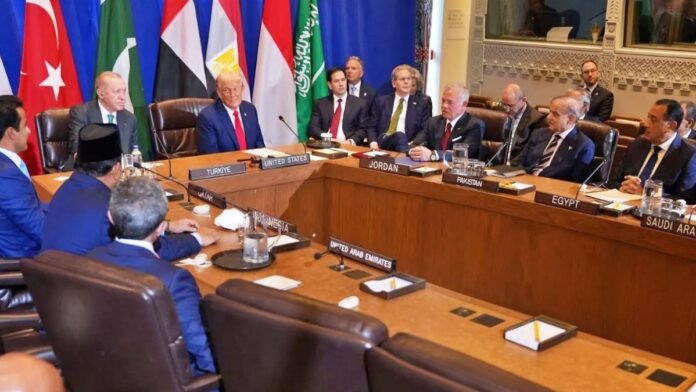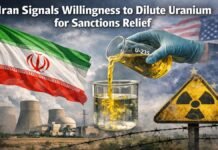
Key Points
- Foreign ministers from 8 Muslim nations welcome President Trump’s comprehensive Gaza peace plan and pledge full support for implementation
- 20-point peace proposal includes immediate ceasefire, hostage release within 72 hours, and Hamas disarmament
- International oversight body led by Trump proposed to govern Gaza during transition period
- Hamas examining proposal “responsibly” but has not yet provided official response as of September 30, 2025
- Over 66,000 Palestinians killed and 168,000 injured since October 2023, with humanitarian crisis reaching famine levels
Washington D.C: The foreign ministers of Qatar, Jordan, the United Arab Emirates, Indonesia, Pakistan, Turkey, Saudi Arabia, and Egypt issued a joint statement on Monday welcoming President Donald Trump’s comprehensive Gaza peace plan. The eight nations expressed confidence in Trump’s “leadership and sincere efforts” to find a path to peace in the region, marking unprecedented regional unity behind a U.S.-led peace initiative.
The ministers emphasized the importance of their partnership with the United States in securing regional peace and stability. They affirmed their “readiness to engage positively and constructively” with the United States and relevant parties to finalize and implement the agreement.
Comprehensive 20-Point Peace Framework
Trump’s proposal, officially titled “Comprehensive Plan to End the Gaza Conflict,” was announced during a joint White House press conference with Israeli Prime Minister Benjamin Netanyahu on September 29, 2025. The plan calls for an immediate ceasefire and requires Hamas to release 20 living Israeli hostages and the remains of over two dozen others presumed dead within 72 hours.
In exchange, hundreds of Palestinians currently in Israeli detention would be freed. The proposal outlines that military operations would cease immediately, with current “battle lines” remaining unchanged until specific conditions for a phased Israeli withdrawal are met.
Gaza’s Future Governance Structure
The peace plan envisions Gaza becoming a “de-radicalized, terror-free zone” that poses no threat to its neighbors. Hamas would be completely excluded from any governance role, whether “direct, indirect, or in any form”. The U.S. has proposed “technocratic, apolitical Palestinians” to manage Gaza temporarily under oversight of a new international transitional body called the “Board of Peace,” which Trump would personally lead.
Former UK Prime Minister Tony Blair and other unnamed international leaders would also participate in this governing entity. Blair described the initiative as “bold and intelligent”.
Critical Elements of the Agreement
The comprehensive agreement includes several crucial components that the eight Muslim nations view as essential for regional stability. These elements encompass unrestricted delivery of adequate humanitarian assistance to Gaza, prevention of Palestinian displacement, release of hostages, and establishment of security mechanisms to guarantee safety for all parties.
The plan also ensures full Israeli withdrawal from Gaza, reconstruction of the territory, and creation of a pathway for just peace based on a two-state solution. Significantly, Trump has committed to preventing any Israeli annexation of the West Bank, a guarantee that has been particularly welcomed by regional leaders.
Hamas Response and Implementation Challenges
Hamas has received the White House’s 20-point blueprint through Qatari and Egyptian mediators. While the organization has stated it is examining the U.S. proposal “in good faith,” it has not yet provided an official response. A senior Hamas representative indicated to the BBC that the group is willing to consider any proposal aimed at concluding the conflict but emphasized that any agreement must protect Palestinian interests and ensure complete Israeli withdrawal from Gaza.
The Palestinian Islamic Jihad has criticized the plan, labeling it as a “recipe for escalating tensions in the region”. However, the Palestinian Authority has expressed gratitude for Trump’s “genuine and relentless efforts to bring an end to the conflict in Gaza”.
Deteriorating Humanitarian Crisis
Gaza continues to face an unprecedented humanitarian catastrophe. According to the latest data, over 66,000 Palestinians have been killed and 168,000 injured since October 2023. The International Food Security Classification declared a famine in the Gaza Governorate area on August 22, 2025, with 2.1 million people facing extreme hunger.
The health system has completely collapsed, with people especially children, pregnant women, and the elderly being treated for severe malnutrition. More than 762,500 displacements have been recorded since the end of the previous ceasefire on March 18, 2025.
International Reactions and Next Steps
British Prime Minister Sir Keir Starmer has expressed support for the plan, urging all parties to collaborate with the U.S. government to finalize and implement the agreement. India’s Prime Minister has also welcomed the initiative, describing it as providing “a viable pathway to long-term and sustainable peace”.
Trump made clear during the press conference that if Hamas refuses the proposal, the United States will stand firmly with Israel to “finish the job”. Netanyahu stated that Israel would take necessary action if Hamas rejects the plan or fails to comply with its terms.
The success of this initiative now depends on Hamas’s official response and the ability of all parties to overcome the complex implementation challenges that lie ahead. Regional experts believe that if the initiative moves forward successfully, it could prove to be a historic step toward ending the decades-long Middle East conflict.





















































